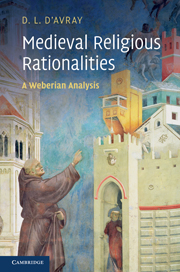Crossref Citations
This Book has been
cited by the following publications. This list is generated based on data provided by Crossref.
2011.
Books Received.
Church History,
Vol. 80,
Issue. 2,
p.
455.
2011.
Books Received.
Speculum,
Vol. 86,
Issue. 3,
p.
874.
Dickson, Gary
2012.
Charisma, Medieval and Modern.
Religions,
Vol. 3,
Issue. 3,
p.
763.
Brown, Andrew
2012.
Charisma and Routine: Shaping the Memory of Brother Richard and Joan of Arc.
Religions,
Vol. 3,
Issue. 4,
p.
1162.
Smith, Thomas W.
2013.
Honorius III and the Crusade: Responsive Papal Government Versus the Memory of his Predecessors.
Studies in Church History,
Vol. 49,
Issue. ,
p.
99.
d’Avray, D. L.
and
Fitzpatrick, Antonia
2013.
Formalizing the Logic of Historical Inference: Contact Details.
Erkenntnis,
Vol. 78,
Issue. 4,
p.
833.
Rennie, Kriston R.
2013.
The Foundations of Medieval Papal Legation.
p.
20.
Melville, Gert
2014.
Die Verfassung des Politischen.
p.
25.
2014.
Dissolving Royal Marriages.
p.
58.
Larrañaga Zuleta, Miguel
2015.
Orden e imágenes en la Edad Media.
Eikon / Imago,
Vol. 4,
Issue. 2,
p.
311.
Smith, Thomas W.
2015.
The Development of Papal Provisions in Medieval Europe.
History Compass,
Vol. 13,
Issue. 3,
p.
110.
Possamai, Adam
2018.
The i-zation of Society, Religion, and Neoliberal Post-Secularism.
p.
115.
Kjær, Lars
2019.
The Medieval Gift and the Classical Tradition.
Müller, Wolfgang P.
2019.
The Symbolism of Marriage in Early Christianity and the Latin Middle Ages.
d’Avray, David
2023.
The Palgrave Handbook of Methodological Individualism.
p.
249.
d’Avray, David L.
2023.
Innocenz III., Honorius III. und ihre Briefe.
p.
27.
2023.
Remembering the Dead.
Vol. 5,
Issue. ,
Shaw, Robert L. J.
Hampejs, Tomáš
and
Zbíral, David
2023.
Modeling systems of sentencing in early inquisition trials: Crime, social connectivity, and punishment in the register of Peter Seila (1241–2).
Historical Methods: A Journal of Quantitative and Interdisciplinary History,
Vol. 56,
Issue. 3,
p.
176.
Aurell, Jaume
2023.
They Are the Treasure of the Commonwealth: Franciscan Charisma and Merchant Culture in Medieval Barcelona.
Religions,
Vol. 14,
Issue. 6,
p.
708.
2023.
Remembering the Dead.
Vol. 5,
Issue. ,
p.
267.



